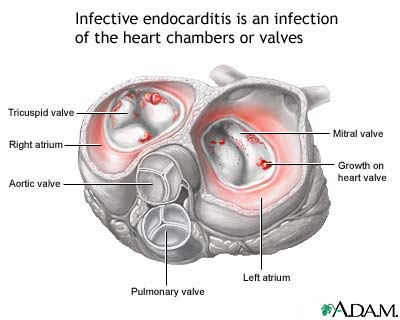What Is A Heart Valve Infection?
By Adam Pick on October 29, 2007
A great question just came in about heart valve disease, specifically a heart valve infection. The email reads, “Adam, what is a heart valve infection? What are heart valve infection symptoms?”
As you may be aware, there are several different types of heart valve disease which can damage the heart valves and result in heart valve repair and/or heart valve replacement. I was born with a bicuspid aortic valve that suffered from aortic stenosis and regurgitation. This led to my Ross Procedure (aortic valve replacement) a few years back. To learn about that operation, click here.

However, there are other forms of heart valve disease, including bacterial heart valve infection. The most common infection is bacterial endocarditis. For those of you who don’t know, bacterial endocarditis is a heart valve infection of the heart’s inner lining (endocardium). Bacterial endocarditis can damage or even destroy your heart valves.
Above, you will see a heart valve infection diagram which illustrates bacterial endocarditis (heart valve infection) on the tricuspid valve and mitral valve.
According to the American Heart Association, there are about 29,000 cases of endocarditis diagnosed a year.
Now that we know what bacterial endocarditis is, I can get back to the original question, “What are the heart valve infection symptoms?”
Diagnosing heart valve infection symptoms over the Internet is pretty impossible. And, self-diagnosis can drive you crazy. That said, here are some heart valve infection symptoms to be watchful of.
- Fever which may be present on a daily basis for months before other symptoms appear.
- Fatigue, malaise (general discomfort)
- Headache
- Night sweats
- Small dark lines, called splinter hemorrhages, may appear under the fingernails.
- Enlarged spleen
- Mild anemia
- Murmurs result from changes in blood flow across valves when clumps of bacteria, fibrin and cellular debris, called vegetations, collect on the heart valves. The mitral valve is most commonly affected, followed by the aortic valve.
In review of these heart valve infection symptoms for bacterial endocarditis, you may note that some patients are asymptomatic. That means a patient may have a heart valve infection but fails to manifest any of the common symptoms referenced above. That said, I would suggest additional research if you are nervous about your condition. A key part of that research is visiting your internal medicine physician or cardiologist.
Heart valve infections can be treated with heart valve repair and/or heart valve replacement operations.
Keep on tickin!
Adam
|
Paul says on September 17th, 2012 at 7:22 am |
|
Hi Is it possible that infective endocarditis can be treated successfully (i.e. using IV Gentamicin), but the resultant heart damage is so severe it can still cause LV heart failure (through severe aortic stenosis)? Thanks in advance Paul |
 |
|
shashikant kardile says on October 25th, 2013 at 5:18 am |
|
hi, |
 |
|
patty white says on January 29th, 2015 at 8:53 am |
|
I had open heart surgery on my mitral valve they repaired it 6 years ago I started fainting again do I have an infection now no systems though except for fainting started today |
 |











